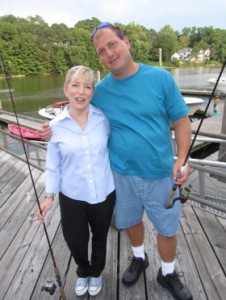Sara’s Weeknight Meals: Season 02
Episode 212: Gone Fishin’ with Dave Pasternak
 As Mario Batali wrote in the introduction to Dave Pasternack’s cookbook, “The Young Man and the Sea, Recipes and Crispy Fish Tales from Esca”:
As Mario Batali wrote in the introduction to Dave Pasternack’s cookbook, “The Young Man and the Sea, Recipes and Crispy Fish Tales from Esca”:
“Dave Pasternack is the best thing to happen to Italian fish cooking in a long time. Why? Nobody knows more about fish, fishing and fish cooking. He has an unequaled passion for all things from the deep. He lives a hundred yards from the ocean; he’s out fishing when he’s not cooking, and he co-owns a great fish restaurant.”
I couldn’t agree more. I have loved dining at his restaurant Esca here in New York City for many years. The fish is so fresh and the recipes so simple yet delicious. And that is the point, when you have great ingredients, you don’t have to mess with them very much at all.
Where does the show air in your neck of the woods?
Click here to find out!
About Dave Pasternak
 In 2005, The New Yorker identified Dave’s strength as “knowing when something needs a little something.” Similarly, Frank Bruni, in his three-star New York Times review of ESCA, called Dave a “fish whisperer.” Indeed, Dave respects the nuances of fish cookery and embraces its subtleties. In 2004, the James Beard Foundatioin recognized Dave as Best Chef: New York City. He’s also an avid fisherman and is equally enthusiastic about catching fish as he is about serving it. At ESCA, freshness reigns, whether it’s a just-caught halibut from the Pacific, flown in a few hours before dinner or a local striped bass caught by Dave himself at home on the Long Island Sound.
In 2005, The New Yorker identified Dave’s strength as “knowing when something needs a little something.” Similarly, Frank Bruni, in his three-star New York Times review of ESCA, called Dave a “fish whisperer.” Indeed, Dave respects the nuances of fish cookery and embraces its subtleties. In 2004, the James Beard Foundatioin recognized Dave as Best Chef: New York City. He’s also an avid fisherman and is equally enthusiastic about catching fish as he is about serving it. At ESCA, freshness reigns, whether it’s a just-caught halibut from the Pacific, flown in a few hours before dinner or a local striped bass caught by Dave himself at home on the Long Island Sound.
David Pasternack is a master chef whose specialty is fish and who practices his art at Esca, his restaurant on West 43rd Street in Manhattan. Mr. Pasternack’s major innovation, when Esca opened in 2000, was introducing New Yorkers to the delicately seasoned raw-fish combinations known as crudo, the restaurant’s Italianized version of sashimi — with a dollop of olive oil, lemon juice or vinegar, a dot of sea salt (Mr. Pasternack uses several kinds) and minuscule garnishes from the chef’s imagination: sea beans, artichoke slices, pine nuts, pickled fiddleheads.
Frank Bruni, the restaurant critic of The New York Times, wrote in 2007 in his three-star (excellent) review of Esca — which means “bait” in Italian — that Mr. Pasternack enjoys “some preternatural rapport with the sea’s creatures, an extrasensory insight” and that he can “tease out their greatest performances.”
“He’s an honest-to-God fisherman,” Mr. Bruni continued, “in love with the ocean, and Esca is his ongoing ode to it.”
Among the favorite dishes Mr. Bruni cited were orange marlin, seared and served with fava beans; and pink snapper, grilled and presented with the skin on.
Mr. Pasternack grew up in Rockville Centre, N.Y., close to the South Shore of Long Island, and developed his love for the sea — and for fishing — at an early age. When he was 14, he was a busboy in a steakhouse in Rockville Centre. “I started cooking when I was 18,” he once recalled, “and my first job was in a fish restaurant on Long Island.” He went to culinary school at Johnson & Wales University in Providence, R.I., and spent two decades working in New York restaurants, many of which specialized in French cuisine — including La Reserve, Bouley, Steak Frites, Prix Fixe and Sam’s. “Over the years, I had lots of French training,” Mr. Pasternack recalled, “but I wanted to do fish.”
His major break came when he went to work at Picholine, on the Upper West Side of Manhattan near Lincoln Center. In a 2005 profile of Mr. Pasternack in The New Yorker, the writer Mark Singer noted that when Ruth Reichl of The Times gave Picholine three stars in 1996, “it was understood that Pasternack, the chef de cuisine, deserved much of the credit. One of his signature dishes was seared sturgeon with caviar sauce; the fish was served with a reduction of shallots, white wine, champagne vinegar, tarragon, and peppercorns whisked with a beurre blanc, to which malossol caviar was added at the last moment.” Esca was started by Mario Batali and Joseph Bastianich, in combination with Mr. Pasternack, who is co-owner as well as chef. In reviewing Esca after its 2000 opening, William Grimes said that the crudo appetizers “are the freshest, most exciting thing to happen to Italian food in recent memory” and that much of the menu is “simple but arresting.”
In 2004, Mr. Pasternack won the James Beard Award as best New York chef. Mr. Singer wrote that for several years, Mr. Pasternack would travel to Esca from his home in Long Beach, N.Y. (also on the South Shore) with “plastic garbage bags containing fish that he’d caught the previous day.”
In his 2007 review, Mr. Bruni wrote that Esca “is a steady, well-oiled trawler moving through placid seas.” The secret of the chef’s success? “It’s passion,” Mr. Pasternack told Mr. Singer, “plus knowing when something needs a little something.”
Sponsors

